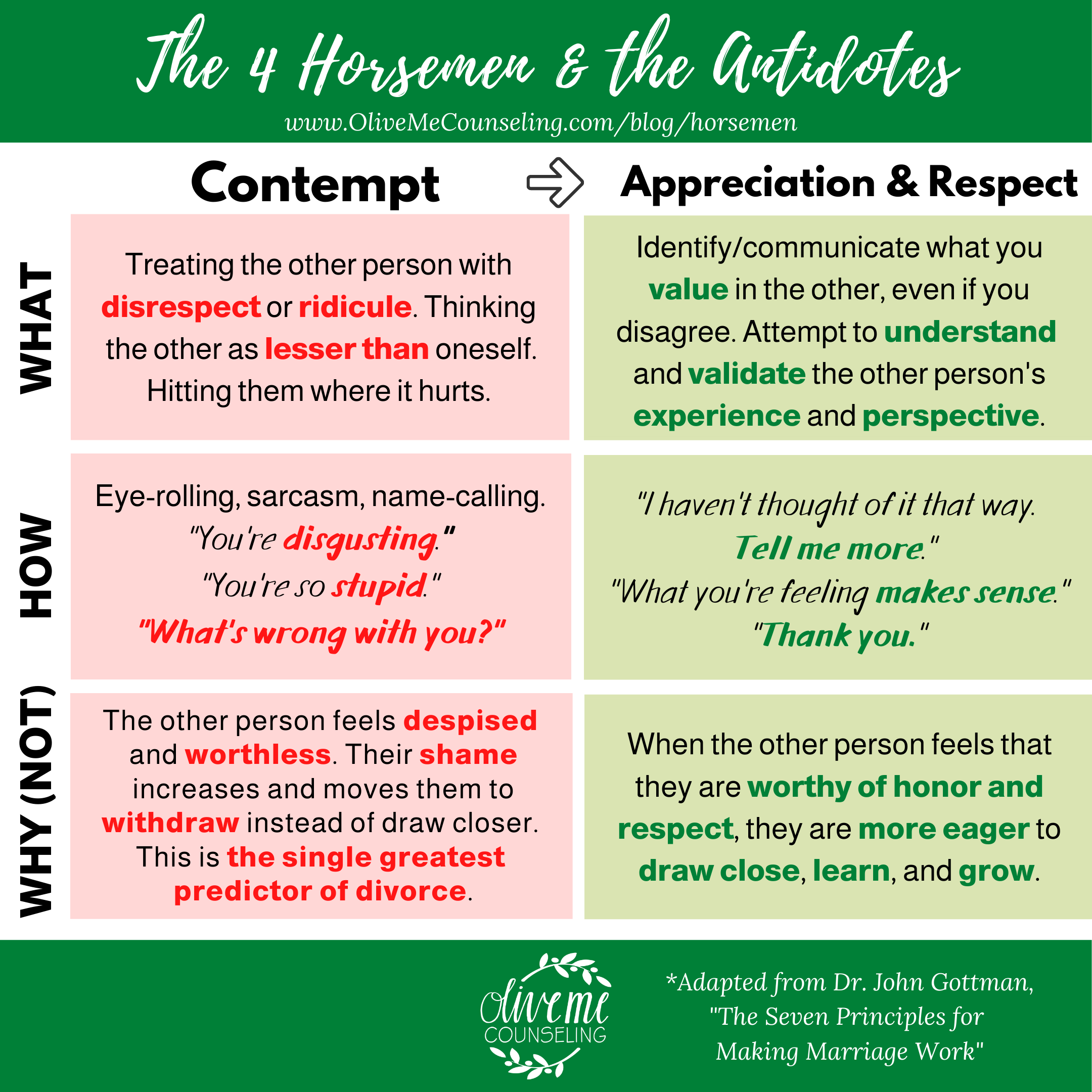In the last entry, I wrote about "The Four Horsemen of the Apocalypse," or four common patterns that erode relationships: Criticism, Defensiveness, Contempt, and Stonewalling. All of these are responses to and generators of pain. Left unattended, these four horsemen destroy relationships. Attempts to self-preserve lead to other-attack, triggering an ongoing destructive cycle. However, this post discusses the Four Antidotes, healer of relationships.
There is a way to reverse the cycle towards mutual care, compassion, and connection. Through what John Gottman calls the "Four Antidotes," the relationship can eliminate the toxic effects of the horsemen and foster genuine EMPATHY, or the ability to be deeply connected to another while remaining fully oneself.
Going for Win-Win
The goal of the four antidotes is to push each person's empathy button that makes room for both to fully exist in harmony. Here are the four antidotes corresponding with each horseman:
The four antidotes make it possible for each person to be fully valued and connected in their uniqueness. When a problem happens, each person takes ownership of their own role, brings their own gifting, and faces the problem together. In doing so, they become truly compatible: "to suffer together", not alone.
Test Out the Four Antidotes!
All relationships involve pain and conflict. No one is immune. However, the goal of healthy relationships is not to AVOID fighting, but to fight FOR safety and trust TO connect. When things get tough, don't give up. Slow down, do self-care, and explore what may be interfering with your ability to connect with those whom you deeply love.
Like any skill, these four antidotes take focus, feedback, and practice. Here are the steps:
Identify the horsemen you tend to summon.
Identify and try out the corresponding antidotes.
Notice what happens. Does the same cycle happen, or is there a difference?
If any of your horsemen seem stubborn and you feel stuck, you might benefit from individual or couples therapy so that you can unlock your ability to enjoy wholesome, thriving relationships with your loved ones or partner.
The BIG Feelings First Aid Kit
Messy feelings spilling out at the WRONG TIME, WRONG PLACE, WRONG WAY?
Grab this free PDF guide that shows you how to handle feelings like a pro so that you can keep moving forward in life!
© Copyright 2021 Joanne B. Kim. All rights reserved.
Joanne B. Kim, LMFT
Joanne is a Licensed Marriage & Family Therapist and Certified Brainspotting Therapist in San Jose, CA, who loves helping people create emotionally thriving relationships. She helps people EXHAUSTED by anxiety, shame, and an allergic reaction to anger create VIBRANT relationships where they matter, too.
Many of her clients are:
(1) the highly responsible, conscientious, and empathic types
(2) Enneagram Type Ones, Twos, Fours, or Nines
(3) Highly Sensitive Persons (HSPs)
(4) adult survivors of emotional abuse and neglect
The most common words spoken by those who’ve sat with Joanne:
“I thought it was just me. I’m NOT crazy!”
“I can finally figure out what to do with all these feelings!”
Does this resonate?
Proudly helping women, healers, pastors, caregivers, and Highly Sensitive Persons (HSPs) who are EXHAUSTED by anxiety, guilt, shame, and an allergic reaction with anger create VIBRANT relationships where THEY MATTER, TOO!
Enneagram, EMDR, and Brainspotting Therapy in the Silicon Valley (Santa Clara County - San Jose, Los Gatos, Campbell, Cupertino, Saratoga, Santa Clara, Sunnyvale, Los Altos, Milpitas) and the San Francisco Bay Area. Offering telehealth video sessions in California.







































“The Mask”, featuring Jim Carrey, is a great movie that illustrates what the Enneagram types are like: masks (or personas) we don until we become so “fused” with them that we forget our true selves. Read this blog to learn about your mask!